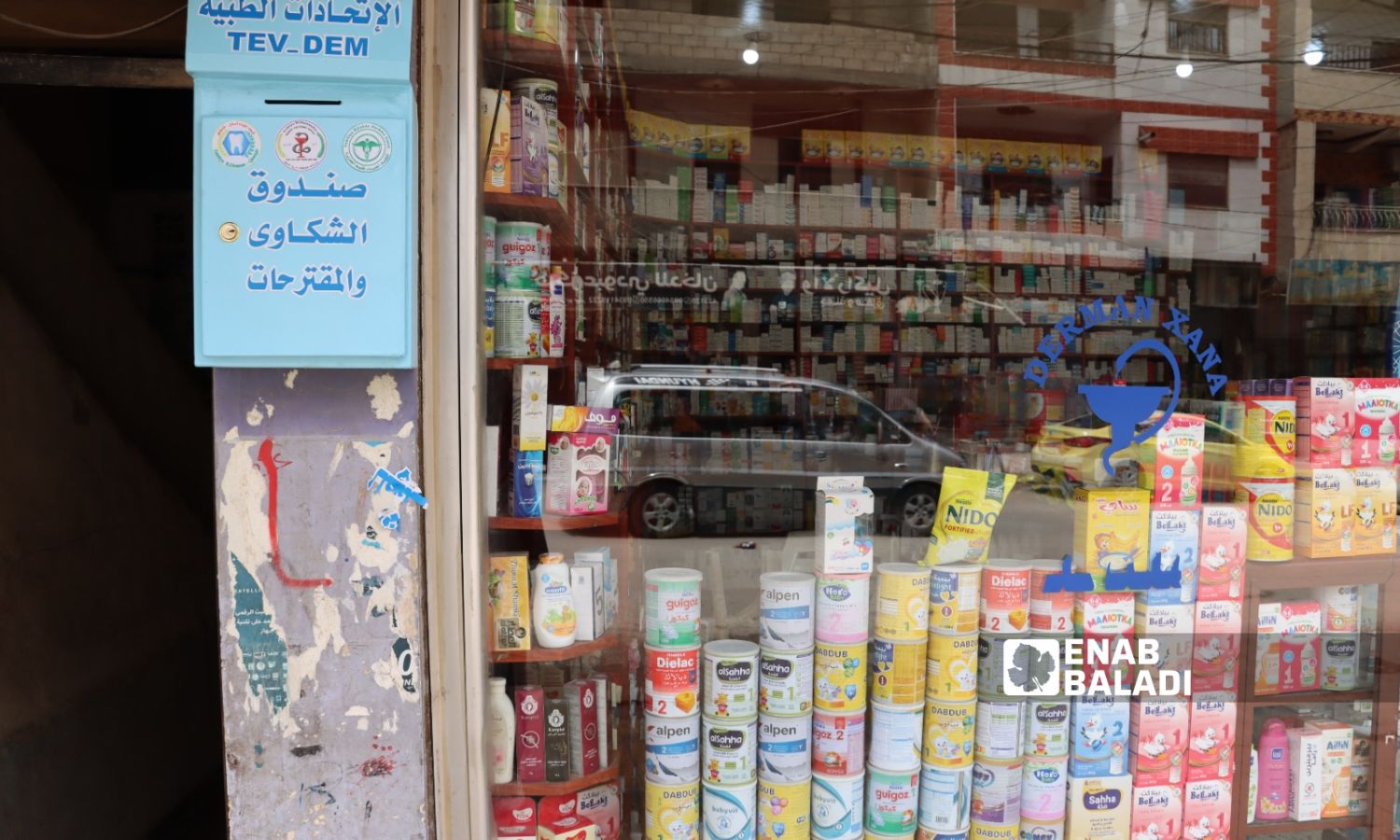



Al-Hasakah – Rita Ahmed
In the absence of a control entity and despite the existence of a “complaints box” to receive any complaints related to pharmacies, doctors, and laboratories, the prices of medicines in the pharmacies of al-Hasakah governorate, northeastern Syria, vary by “significant” rates.
A large discrepancy in the prices of medicines exhausts the people, in addition to the high prices, due to its being affected by the prices of medicines in the areas controlled by the Syrian regime and the depreciation of the value of the Syrian pound against the US dollar
($1=14,850 SYP) according to the S-P Today website, which covers the trading rate of the Syrian pound to the dollar.
Pharmacies in al-Hasakah and its cities, which the Autonomous Administration controls, resort to securing medicines from regime-controlled areas (Aleppo or Damascus), and some residents may be forced to use alternative foreign medicines and bear the dangers of using medications from unknown sources.
There are more than 200 pharmacies in the city of Qamishli, according to a source in the Health Authority of the Autonomous Administration of North and East Syria (AANES), and the disparity in prices is very clear, according to what was monitored by Enab Baladi’s correspondent in the region.
Salam Ahmed, a mother of a five-year-old girl with a disability, told Enab Baladi that she buys medicines continuously for her daughter, and the cost of medicine amounts to more than 100,000 Syrian pounds per week, which is expensive even though she buys it from a warehouse on al-Wehda Street in Qamishli.
Ahmed mentioned that she is sometimes forced to buy medicines from many pharmacies located on the same street because they are not available in the warehouse, pointing out that the price discrepancy has become clear to everyone.
The difference in the price of the medicine she bought from one pharmacy to another is 6000 Syrian pounds.
As for Abdul-Basit, 68, who was displaced from the city of Ras al-Ain and lives in the Halkou neighborhood of Qamishli, he told Enab Baladi that he is having difficulty securing the price of the medicine needed to treat heart disease due to the “crazily” high price.
He added that his son buys medicines for him on a monthly basis, and he cannot stop taking them. The price of one item is 25,000 Syrian pounds, and he needs three boxes of it per month.
Abdul-Basit complains about the high price, wondering if medicine has become a “luxury.”
A pharmacist in the al-Khalij neighborhood of Qamishli told Enab Baladi that the high and instability of the price of medicines is linked to the decline and fluctuation of the value of the pound against the dollar.
The pharmacist, who asked not to be named, stated that shipping any materials to the city, including medicines, has become very expensive, which is reflected in the price of the medicine.
The bus fare between Damascus and al-Hasakah governorate increased, as the ticket price per passenger reached 66,000 Syrian pounds, compared to 44,000 Syrian pounds, and the price of a ticket for businessmen reached 85,000 Syrian pounds, compared to 55,000 Syrian pounds.
The pharmacist added that the high prices and their disparity led to a decline in sales, and the demand was limited to urgent medicines, namely medicines for blood pressure, heart, and diabetes, in smaller quantities than before.
In a previous statement to Enab Baladi, an accountant in one of the drug warehouses in the AANES areas in Qamishli said that the drug warehouses add to the price of the medicine the shipping fees from the regime’s areas, which are determined exclusively in US dollars, in addition to the warehouses’ fares and operating costs such as workers’ salaries, fuel, and others.
According to the accountant, the price rise is exacerbated by taxes and fees that are paid to the government of the regime and the regime’s Fourth Division that takes fees on drug shipments in dollars exclusively, even if the warehouse has papers and regular invoices for the drug shipment showing that all dues have been paid to the “state,” and the last party to add fares is the Autonomous Administration.
The state of discrepancies in the price of medicines continues, despite the fact that the Local Administration Authority said, on July 6, that a complaint, if any, can be submitted against pharmacies, doctors, laboratories, or dentists.
The AANES body mentioned that citizens can file a complaint in a special “complaint box” that was placed on al-Atebaa (Doctors) Street through a piece of paper in which the complainant’s full name, phone number, date, and subject of the complaint are written.
It is forbidden to submit a complaint without mentioning the previous details, and personal complaints that are not related to the profession are not accepted, according to the Local Administration Authority.
A source in the Health Authority said that there is control over medicines and pharmacies through conducting continuous rounds, and when any violation is caught, the pharmacy is closed, and the owner is fined.
The source added that amid the turmoil in the value of the pound, it has become difficult to control all pharmacies and to limit price manipulation; the Health Authority met with the “Pharmacists Union,” and it was decided to set up a “complaints box.”
if you think the article contain wrong information or you have additional details Send Correction